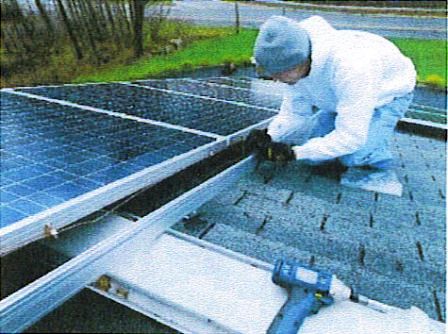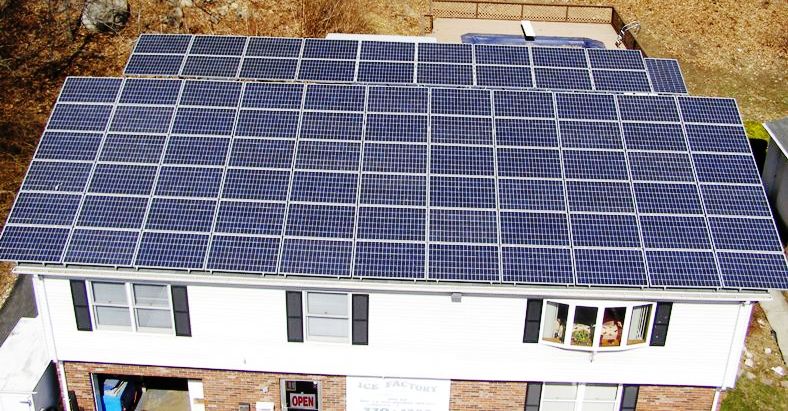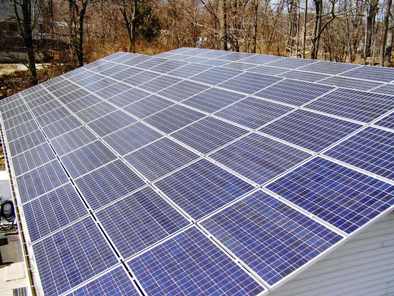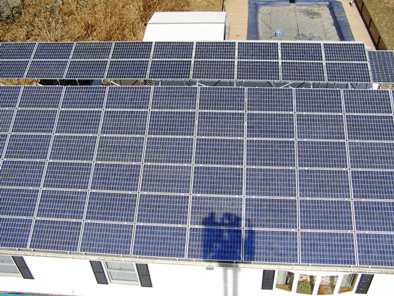|
|
|
Solar Panels |
| |
|
|
| |
|
Roxbury ice maker will use
sun to aid in make cubes |
| |
|
 |
 |
| |
|
ROXBURY -- In the very near
future, Fred Schuld will be making ice from sunlight. Schuld,
owner of The Ice Factory in Landing, has installed 85 solar
panels on the roof of his home/business, which will run the ice
makers that provided his livelihood for the past 19 years. His
company provides cubed ice for retail sales, dry ice, cold
packing and shipping and fog machine rentals from his
combination home and business on Landing Road. He held up a
solar energy pamphlet from The Home Depot. "This is where it
started," Schuld said. "I was talking to a friend about solar
energy, and he showed me this." That conversation led to a call
to 1st Light Energy of South Plainfield, a solar-energy
contractor and to a plan to swap over his home's electric system
to solar. "This is probably the largest array in Roxbury,"
Schuld said. He is installing a 15,000-watt system that
will power his ice-making operation and supply the home's
electric power needs. |
| |
|
 |
| |
|
Why go solar? He said the solar system helps the
environment and his bottom line. Schuld said his average
electric bill is $13,000. The new system will drop his annual
electric cost by $8,000 to $9,000, including an annual $4,320
Solar Renewable Energy Certificate, generated by the sale of
excess electricity to the power system. He also is qualified for
a 30 percent federal tax rebate related to his business, and he
received a $72,000 rebate from the state Clean Energy Program to
cover a significant portion of the $122,000 installation costs.
His final cost for the solar system was $49,330. Schuld said.
He will be able to break even on the installation in five years.
His home is on an open ridge facing southwest, Schuld said. It
is backed by a line of trees that does not shield his home. In
the summer, he said, demonstrating a wide arc with his arm, the
sun rises in the northeast and moves through a clear sky toward
the west. His home is exposed to the sunlight for hours. An
additional benefit, he said, is that the roof, with typical
asphalt shingles, will be shielded from direct sunlight by the
solar panels and the home will stay cooler in summer. |
| |
|
 |
 |
| |
|
Electrician Steve Rhodes of
Middlesex has been installing solar power systems for about two
years. On Wednesday, he was installing the inverters that change
the solar power to electricity. He planned to finish the usual
two-day installation in one day. Rhodes said the solar
installation business was booming until June, when concerns
about the rebate fund operated by the Clean Energy Office of the
New Jersey Bureau of Public Utilities arose. The $80 million
fund is being investigated. The result of that investigation
and the announcement of reductions in the rebate amounts,
because the state received more solar applications than it could
pay for, dramatically reduced the demand for solar, Rhodes said.
Schuld applied for his Clean Energy rebate a year ago and
faithfully checked the bureau's Web site to see if he would make
the cut, which he did. The Clean Energy program is funded by a
$10 to $20 fee added to customer electric bills. That fee is
collected by the BPU, which in the spring was admonished in a
state treasury report that said the agency had little control
over the Clean Energy fund. The report said there was poor
record-keeping and grants were given to former BPU employees.
The BPU disputed the report's conclusions. Clean Energy
officials said the solar program's standards were changed
because the program had received many more rebate applications
than it could fund. 300 percent increase.
The BPU order announcing the
changes said the Consumer On-Site Renewable Energy program grew
300 percent in three years. It was funded at $273 million, with
an $86.6 million carryover. The changes resulted in unfunded
approved rebate applications placed on hold to allow them to be
funded as money became available. The changes also reduced the
size of the rebates. In 2005, the Clean Energy program funded
27,5210 rebates for residential high-efficiency heating or
cooling installations, 6,403 energy efficient improvements to
low-income homes, 2,387 business energy efficient installations,
and 496 solar electric or other renewable energy systems for
schools, businesses and homes. Justin Krum of 1st Light Energy,
Schuld's contractor, said Schuld just made the rebate cut-off.
"Waiting a year for a rebate is a long time," he said. "But that
is about as long as people will wait. After that, they might
reconsider the application."
“Still growingm,” Krum said
his company has been in business for about 30 months, covering a
section of North Jersey along the Route 80/287 corridor. The
bulk of the company's business is homes and small businesses for
people like Schuld, who want to save money and help the
environment, he said. Despite the issues with the state's
rebate program, Krum said, the solar installation business is
growing, and the announcement recently that BP, the giant gas
and energy company, invested millions in solar energy
conversions at its installations is a sign that it is not a
technology that just small businesses and homeowners can use.
The switch will save BP millions in energy costs, he said. New
Jersey needs to find a way to beef up its rebate fund, Krum
said. California commits $3 billion a year, he said, not the
$100 million committed in New Jersey. In 2005, the BPU funded
the refund program at $140 million. Krum said he was confident
the agency would find a way to increase funding. "The future is
excellent," he said. |
| |
| |
| |
|
|
| |
|